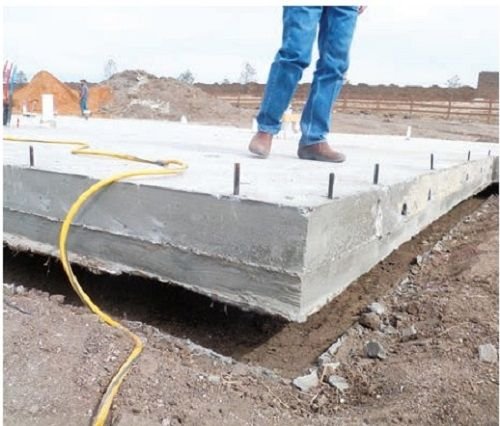Two popular options are raised concrete slabs and slab on grade. But what exactly are they, and how do they differ? Let’s dive in and explore the world of concrete slabs.

A raised concrete slab is a structural element lifted above the ground, supported by columns or piers. This design proves advantageous in flood-prone regions, elevating buildings to prevent water damage.
The space underneath the slab allows for improved ventilation, reducing humidity and minimizing mold growth risks. Raised slabs provide easy access for maintaining utilities like plumbing and electrical systems.
Aesthetically, raised slabs contribute to a modern, open look with ample natural light. Various types include post-tensioned slabs reinforced with steel tendons, precast slabs manufactured off-site, and in-situ slabs poured on location for custom solutions.
By elevating living spaces, raised concrete slabs offer flood protection, enhanced ventilation, maintenance accessibility, and visual appeal – a versatile construction method tailored to specific project needs.
Constructing a raised slab is like baking a layered cake. First, the subgrade is prepared, and a vapor barrier is laid down to prevent moisture issues. Then, the concrete is poured onto the subgrade, often with insulation sandwiched in between. Finally, the slab is finished to perfection.
Of course, no foundation is perfect. Raised slabs can be more expensive due to the additional materials and labor required. The crawl space may also attract pests if not properly maintained. Proper drainage is important to prevent water from pooling below the slab.
A slab on grade is a type of foundation where concrete is poured directly onto the prepared ground surface, without a basement or crawl space beneath. This cost-effective solution is suitable for areas with stable soil conditions and moderate climates.
Key components include:
With minimal excavation required and a straightforward construction process, slab on grade foundations offer an economical option while providing a stable base for residential and light commercial structures.
Building a slab-on-grade is a straightforward process. The subgrade is prepared, and a vapor barrier is installed to prevent moisture from seeping through. Then, reinforcing steel is laid out, and the concrete is poured directly onto the subgrade. The slab foundation is then finished to create a smooth, durable surface.
Slab-on-grade foundations are not without their challenges. They are more susceptible to moisture issues, especially in areas with high water tables or poor drainage. Accessing utilities can be difficult since they are embedded in the slab. Future remodeling or expansions may also be limited.
When it comes to cost, slab-on-grade foundations usually have the upper hand. They require less material and labor compared to raised slabs, which need additional footings, foundation walls, and piers.
Raised slabs have an advantage when it comes to insulation. The crawl space allows for the installation of insulation materials, creating a thermal barrier between the ground and the living space. Slab-on-grade foundations can be insulated, but it requires specialised techniques.
Both raised slabs and slab-on-grade can be durable and long-lasting with proper construction and maintenance. However, raised slabs may have a slight edge due to better ventilation and easier access for repairs.
Soil type plays a significant role in choosing between a raised slab and a slab-on-grade. Expansive soils, which expand and contract with moisture changes, may favor slab-on-grade to avoid structural issues. Well-drained, stable soils can support either option.
If you are building in a flood-prone area, a raised slab is the way to go. The elevation of the slab above the ground helps protect the structure from rising water levels and minimizes the risk of flood damage.
In the battle between raised concrete slabs and slab-on-grade, there’s no one-size-fits-all winner. The choice depends on a variety of factors, including:
By understanding the key differences between these two foundation types, you can make an informed decision that suits your specific needs and ensures the long-term stability and durability of your building.
Looking for reliable foundation solutions? Atlantic Brick and Stone brings over 15 years of specialized expertise to your doorstep. As Fredericton’s trusted foundation contractors, we deliver exceptional results for both repairs and new installations.
Why Choose Atlantic Brick and Stone?
Whether you need foundation repairs or are planning a new construction project, our experienced team is ready to help. We understand that your home’s foundation is crucial for its structural integrity, and we take that responsibility seriously.
A slab on grade is also referred to as a monolithic slab, emphasizing its single, continuous pour of concrete, or in some contexts, as a floating slab, although the latter technically refers to a specific type of slab that floats on the ground without deep footings. However, in general usage, both terms can be associated with slab-on-grade foundations, but it’s essential to note the distinctions between them.
Yes, we can guide you in choosing the best option based on your needs, site conditions, and budget.
With proper construction, maintenance, and care, a raised foundation can last for many decades, often 70 years or more. Regular inspections and repairs can help extend the lifespan of your foundation and ensure the long-term stability of your building.
A well-constructed slab-on-grade foundation can last for several decades, often exceeding 50 years with proper maintenance. Regular care and attention to drainage and moisture can significantly enhance its longevity, making it a reliable choice for homeowners.
GET STARTED
Create stunning structures with our residential and commercial masonry services in Fredericton. From meticulous designs to the completed build, our process is professional and rewarding, and we can’t wait to build your dream with you.
Atlantic Brick and Stone, one of the best masonry contractors in Fredericton, NB
Contact
8 Muskie Street, Lower Kingsclear, New Brunswick E3E 0E7, Canada